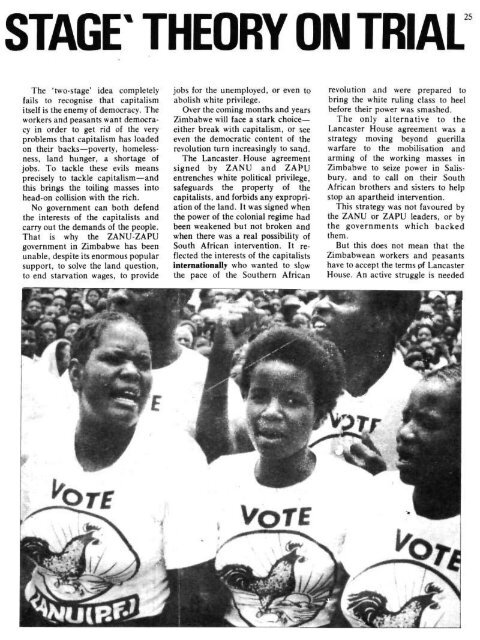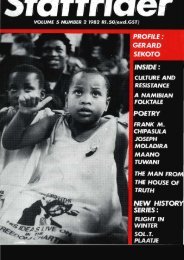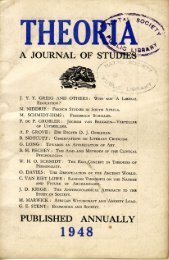Inqaba ya basebenzi Number 2 April 1981 - DISA
Inqaba ya basebenzi Number 2 April 1981 - DISA
Inqaba ya basebenzi Number 2 April 1981 - DISA
You also want an ePaper? Increase the reach of your titles
YUMPU automatically turns print PDFs into web optimized ePapers that Google loves.
STAGE' THEORY ON TRIAL<br />
The # two-stage' idea completely<br />
fails to recognise that capitalism<br />
itself is the enemy of democracy- The<br />
workers and peasants want democracy<br />
in order to get rid of the very<br />
problems that capitalism has loaded<br />
on their backs—poverty, homeless*<br />
ness, land hunger, a shortage of<br />
jobs. To tackle these evils means<br />
precisely to tackle capitalism—and<br />
this brings the toiling masses into<br />
head-on collision with the rich.<br />
No government can both defend<br />
the interests of the capitalists and<br />
carry out the demands of the people.<br />
That is why the ZANU-ZAPU<br />
government in Zimbabwe has been<br />
unable, despite its enormous popular<br />
support, to solve the land question,<br />
to end starvation wages, to provide<br />
jobs for the unemployed, or even to<br />
abolish white privilege-<br />
Over the coming months and years<br />
Zimbabwe will face a stark choice—<br />
either break with capitalism, or see<br />
even the democratic content of the<br />
revolution turn increasingly to sand.<br />
The Lancaster House agreement<br />
signed by ZANU and ZAPU<br />
entrenches white political privilege,<br />
safeguards the property of the<br />
capitalists, and forbids any expropriation<br />
of the land. It was signed when<br />
the power of the colonial regime had<br />
been weakened but not broken and<br />
when there was a real possibility of<br />
South African intervention. It reflected<br />
the interests of the capitalists<br />
internationally who wanted to slow<br />
the pace of the Southern African<br />
revolution and were prepared to<br />
bring the white ruling class to heel<br />
before their power was smashed.<br />
The only alternative to the<br />
Lancaster House agreement was a<br />
strategy moving beyond guerilla<br />
warfare to the mobilisation and<br />
arming of the working masses in<br />
Zimbabwe to seize power in Salisbury,<br />
and to call on their South<br />
African brothers and sisters to help<br />
stop an apartheid intervention.<br />
This strategy was not favoured by<br />
the ZANU or ZAPU leaders, or by<br />
the governments which backed<br />
them.<br />
But this does not mean that the<br />
Zimbabwean workers and peasants<br />
have to accept the terms pf Lancaster<br />
House. An active struggle is needed
















